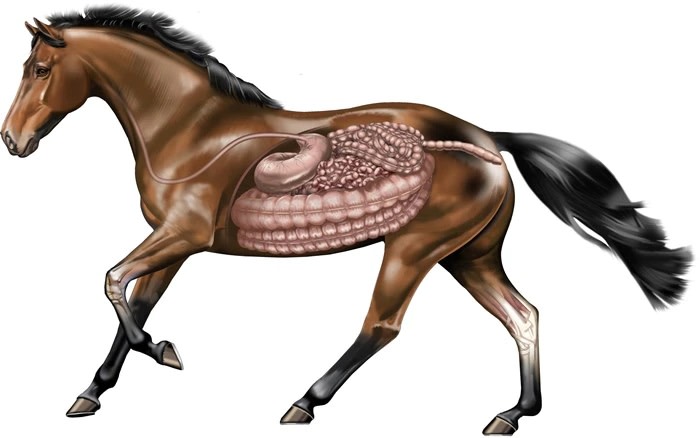How to Shop for Hindgut Supplements for Horses
Updated December 20, 2023
Your horse’s hindgut has many important jobs, from digesting his forage, playing a major role in immune health, absorbing key nutrients, and more. Unfortunately, common events like changes in hay, large grain meals or increased stall time can lead to digestive upset. That’s why it’s smart to provide support for a healthy and balanced hindgut, as it is critical to your horse’s overall health and well-being.

How Hindgut Supplements for Horses Work
Keeping your horse’s digestive system in balance is key to sustaining health and avoiding digestive upset. Digestive health supplements may help maintain health during feed changes, as well as support the normal recovery of the digestive tract lining and assist in the proper digestion of nutrients.
Key Ingredients to Look For
Probiotics
Your horse's hindgut contains microorganisms that are often referred to as "good bugs" because they play many important roles in helping to keep your horse healthy. They break down food ingredients that wouldn't be able to be digested otherwise, like the fiber in hay, and help produce energy and vitamins for the body.
Probiotics are sources of these live, beneficial microorganisms that can be found in many digestive supplements. A few examples of probiotics that you may see in supplements include Lactobacillus acidophilus, Bifidobacterium longum, and Enterococcus lactis. While pronouncing the names of these microorganisms may not be easy, providing probiotics daily in your horse's diet is one way to help support hindgut health!
They are measured in CFUs, or “colony forming units.” For a more basic option, look for a product that offers millions of CFUs of these probiotics, while a more comprehensive product will include CFUs in the billions.
Prebiotics
Prebiotics are sources of non-digestible, soluble fiber that serve as food for the good bugs, helping to keep them healthy so that they can perform their important role in the digestive process. Research suggests that providing a consistent food source like prebiotics may help maintain those good bugs during times of stress.
Examples include fructooligosaccharides (FOS), inulin, mannanologosaccharides (MOS), pectin, psyllium and arabinogalactan. You’ll see around 500-2,000 mg of each, or a combination of these ingredients in digestive support products.
Yeast
Research has also shown that providing yeast stabilizes cecal and colon pH, helping to ensure a healthy gastrointestinal tract. Additionally, yeast may aid in fiber digestion and also assist the beneficial bacteria of the cecum in adjusting to feed changes.
Depending on the form provided, yeast may either be measured in milligrams or CFUs. A common form of yeast is Saccharomyces cervisiae which is measured in CFUs. Similarly to probiotics, most products that offer this ingredient include millions of CFUs for support.
You may also see yeast listed by brand names like DVEquine™ Postbiotic, brewer’s yeast, or active dry yeast. Anywhere from 50 to 7,000 mg of yeast is common, with higher amounts offering more support.
Enzymes
Enzymes break down fats, protein, and starch into smaller particles that are able to be absorbed. You may see enzymes like protease, which helps break down proteins; lipase, which helps digest fat; and amylase which helps proper digestion of sugar in the foregut.
Enzymes can be tricky to compare because they can sometimes be listed in milligrams or in units of enzymatic activity. Each enzyme has its own activity level, but keeping an eye out for these enzymes in digestive support supplements is a good idea if you’re looking for comprehensive support.
Horses That May Benefit From a Hindgut Supplement

There are a number of common, unavoidable barn events that can increase your horse’s risk of digestive upset, including the ones listed here.
- Changes in hay, including simply feeding a new cut from the exact same field, can increase your horse’s chances of developing digestive upset by 10x!
- Lack of turnout is unnatural for horses, and increased stall time can increase your horse’s chances of digestive upset.
- Grain changes, including changes in amount, type, or brand, can cause a 5x increase in your horse’s risk for digestive upset.
- Sudden changes in exercise or activity level have been shown to increase digestive disruption. One example is a sudden decrease in work and turnout, which is often associated with a horse going on stall rest due to injury.
And the risks don’t stop there! Read this article to learn more about the proven risk factors for digestive upset and how you can help your horse. Because some of these risk factors are unavoidable parts of modern horsekeeping, many horses may benefit from hindgut support. If your horse is facing multiple risk factors, it’s a smart choice to choose a comprehensive product that includes all of the ingredients listed above.
What to Expect From Hindgut Supplements for Horses
Hindgut support supplements generally take 6-8 weeks to reach their full benefit, although some customers report that they are happy with the results much sooner! While we can’t see the digestive tract doing its job from the outside, if your horse was prone to digestive upset or inconsistent manure, you may notice him maintaining digestive balance and normal quality manure.
Shop All Digestive Health Supplements
Need Help Deciding? Our Smarts are at Your Service!
If you’re still not sure which supplement would be ideal for your horse, don’t fret - our Horse Health Experts are here for you! Just contact us and we’d be happy to help you choose the perfect supplement program for your horse.
If you’re managing active hindgut issues, we also recommend working with your veterinarian to help come up with the best treatment and management plan for your horse.